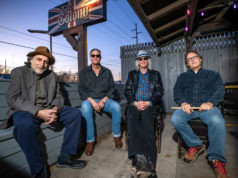
I don’t usually search for clues to an existential existence in the lyrics of the Oakridge Boys, but I’m not opposed to it, either. So when I really, truly, deeply received a quasi-religious experience while listening to Leaving Louisiana (In the Broad Daylight) (see above), I wasn’t entirely surprised — but I was grateful.
The minute I heard the jangling acoustic guitar ring out on Big Country 99.5, I knew it was the Oakridge Boys. I was in the parking lot of Viet Huong, an august institution in the Tulsa community known for their deliciously bright, clear pho broth. I had just arranged my take-out Vietnamese fried rice with extra Asian sausage in the passenger seat of my truck when the lyrics started to pour over me:
Mary took to running with a traveling man.
Left her mama crying with her head in her hand.
Such a sad state, so broken-hearted.
What a way to start a story. It’s like an opening salvo declaring that this song is going to be rooted in deep, dark, Southern twists and turns. It’s damn near an opening line the Cohen brothers could have lifted for an O’ Brother, Where Art Thou? scene.
Stick with me here
It goes on:
She said ‘Mama I got to go, gotta get our of here.
Gotta get out of town, tired of hanging around.
I gotta roll on between the ditches.
Can’t we all relate? Haven’t we all been fed up with the life that is expected and predictable? How many of us through the ages have run away from our hometowns, seeking our glory and fortunes in a new place? Even if we haven’t all acted on it, we’ve all felt it.
Just an ordinary story ‘bout the way things go.
Round and around nobody knows except the highway
rolls on forever. That old highway rolls on forever
Just an ordinary story, right? Maybe. But maybe it’s an ordinary story because everyone has felt a longing for a life beyond what we know or were raised with. Nobody knows? The storyteller is smart enough to know what they don’t know, what is ultimately the un-knowable.
“Highway rolls on forever” initiates the listener into a higher dimension of storytelling. It’s an acknowledgment of the unknowable and the eternal, topics usually reserved for monks and medicine men. At this point the Oakridge Boys are channeling the ancient art of mystic storytelling. This is some heady gris-gris, recognizable to anyone tuned into existential thought. These lyrics and the country music backing create a vibe that is part psychedelic induction, part meditation on the meaning of life, part hootenanny, and all Southern Gothic.
Mary exhibits empowerment
She said, never have I done it when it felt so good.
Never have I done it when I knew I could.
Never have I done it when it looked so right.
Leaving Louisiana in the broad daylight
Boom! She’s gone. Mary was sick and tired of what I have to assume was an amazingly repressive rural Louisiana town. One can only imagine the unpleasantness that a young woman may face in such an economically deprived area now, much less during the 1930s Depression.
Throughout the song, everyone concerns themselves with Mary keeping her purity and remaining within the confines of what is socially acceptable.
This is down in the swampland anything goes.
Its alligator bait and the bars don’t close.
It’s a real thing down in Louisiana.Have you ever seen a Cajun when he really got mad?
Really got trouble like a daughter gone bad?
It gets real hot down in Louisiana.
Fortunately for Mary, the ancient magik of sex had already liberated her. The excitement of her forays into first love with the mysterious traveling man has given her the internal strength to cast doubt and fear from her mind, pushing her further down the eternal highway of life.
Death threats follow
Of course, all is fair in love and war, and rural Louisiana is no exception. The traveling man may or may not have been serious in his relationship with Mary, but we will never know.
Stranger better move it or he’s gonna get killed.
He’s gonna have to get it or a shotgun will.
This ain’t no time for lengthy speeches.
This verse fully explains the overbearing nature of the father figure. The font of empowerment from which Mary had drawn her strength and willingness to leave Louisiana has been compromised. Her father and mother – either by remaining uninitiated into the mystic realm or having been so long disconnected to any glimmer of life beyond the bayou – do all they can to drag their daughter back into submission.
Questions remain for the Oakridge Boys
Did Mary get out? What happened to the traveling man? What was her relationship with her mother and father like after this scandalous episode? How did the town folk, who surely knew of the affair, react? Did Mary’s glimpse into the great unknown stick? Did she ever find a way to break the cycle of rural poverty?
These are all questions I ponder each time I listen to the track. What’s for sure is that the story the Oakridge Boys tell has stayed with me. Through Mary’s revelations about life, I am able to see my revelations more clearly. If Mary couldn’t truly make it to a life lived on her terms, maybe we can?
Just an ordinary story bout the way things go …





















